May 14, 2025 | 20:35 GMT +7
May 14, 2025 | 20:35 GMT +7
Hotline: 0913.378.918
May 14, 2025 | 20:35 GMT +7
Hotline: 0913.378.918
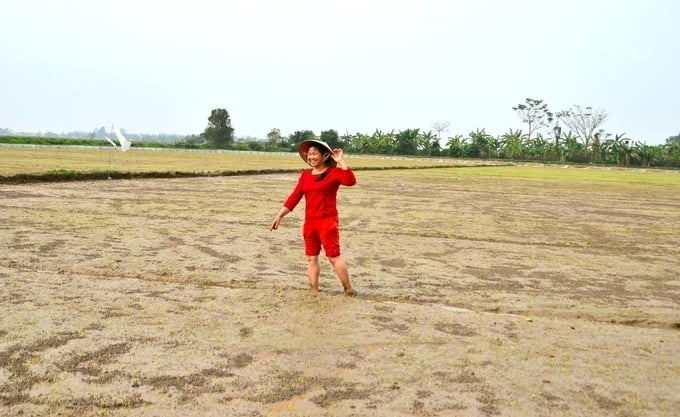
Model of rice cultivation without plowing. Photo: Duong Dinh Tuong.
Mr. Trieu Ngoc Son, Director of Van Xuan Truong Cooperative, Nam Dinh province, bravely applied new techniques even though the district's specialized agency did not direct it. "When it comes to bringing new technical advances into production, you have to accept risks because success and failure can be 50/50, but 100% is no longer new," he said.
Mrs. Nguyen Thi Man and another farmer in Hien Khanh commune, Vu Ban district, are pioneers in applying the no-till rice growing technique to circulate nutrients on the spot with pre-sprouted seeds with Dai Thom 8 rice variety in an area of nearly 1.5ha.
They gave up their initial hesitations and the age-old habit of Vietnamese farmers plowing deeply, harrowing carefully, and then soaking like "three boiling, two cold" to open their hearts and accept the new.
Previously, in 2022, the no-till rice planting technique with on-site nutrient circulation and pre-sprouted seeds was implemented by Nam Dai Duong Cooperative in Minh Tan commune and gave quite positive results.
Similar to previous results, in Hien Khanh commune, rice plants grown using new techniques grow entirely typically, with no difference in productivity compared to traditional farming. However, the amount of fertilizer used decreased by 18%. Thanks to that, it creates an economic efficiency of VND 4 million per hectare, higher than traditional farming, helping farmers increase their income by 10-15%.
While the situation of abandoned rice fields is irresistible in many places because growing rice is ineffective and takes a lot of effort, the profit of VND 4 million per hectare is a large number. Not only does it bring economic efficiency, but this technique also has social and environmental effects.
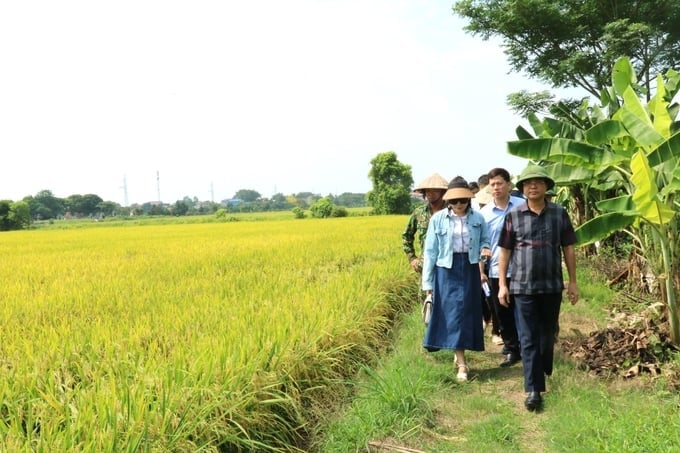
Leaders and officials of Vu Ban district inspect the growing rice without plowing model. Photo: Luong Van Truong.
The no-till rice growing technique helps reduce plowing costs, reduce fertilizers, reduce toxic pesticides, reduce leaching by not disturbing the soil surface and makes the soil more porous because the base and roots are in the soil later. When they die, the water channels will go deeper, forming open tubes when they decompose.
In addition, the straw above the surface gradually decomposes in aerobic conditions, creating fertilizer that penetrates the soil, making the soil more porous without producing methane gas and reducing the greenhouse effect. The decomposition process will also slowly release nutrients for the rice plant to absorb (local nutrient circulation).
On the other hand, this process helps balance the ecology because the land is not plowed and is not washed away into canals, so it does not have to be dredged frequently, making it easier to plant perennial trees on the banks, without having to cut it down for dredging, creating shelter for natural enemies, and reducing the impact of natural disasters.
Because there is no plowing, the ghost rice, mixed rice, and grass seeds left behind from the previous crop will not sink into the ground. These seeds germinate when water is applied to treat the rice stubble and straw. The golden apple snail will then eat all of these seeds. This is a way to take advantage of a harmful organism, the golden apple snail, to turn it into a beneficial organism for a certain period.
Therefore, farmers can handle grass, ghost rice, and mixed rice without dealing with grass, ghost rice, and mixed rice.
Farmers need to immediately bring seeds out to sow regarding seed technology without soaking them. Because the seeds are dormant again, after sprouts and roots appear, they will immediately develop into typical plants, helping farmers reduce 3 to 5 days in the seed preparation stage for each crop. Significantly, when natural disasters occur, if the seeds are damaged, farmers will have germinated seeds ready to fix immediately, avoiding crop delays.
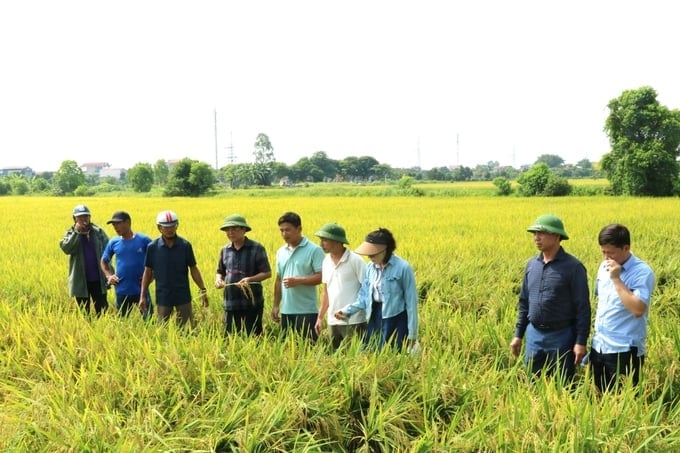
Growing rice without plowing has yields equivalent to traditional methods. Photo: Luong Van Truong.
This completely new technology has been exclusively patented by Mr. Luong Van Truong, Director of Nam Dai Duong Cooperative. It has brought relatively high efficiency through testing in all climate and soil regions of Vietnam and Guma, Japan, from 2018 to the present.
Given the successful results of the 2024 spring crop, Hien Khanh commune will expand the area by applying this new technique to more than 3ha of the 2024 crop. After visiting the model, Mr. Tran Minh Hoan, Secretary of the Vu Ban District Party Committee, highly appreciated the development prospects of no-till rice cultivation techniques and the application of pre-sprouted seed technology.
He suggested that the Nam Dai Duong Cooperative continue to support and transfer this technical process to continue testing and expanding the model throughout the commune in the following years and develop to other communes in the Vu Ban district, which means reducing costs and labor days, significantly reducing the use of pesticides, thereby aiming to build green and sustainable agriculture.
Mr. Luong Van Truong informed that right after the field conference to evaluate this model, many people inside and outside the commune came to inquire and requested technical implementation guidance to apply immediately for the summer-autumn crop 2024.
Mr. Truong actively supports farmers in the Vu Ban and Y Yen districts to deploy in crop 2024. "I wish to raise farmers' awareness of the benefits of the model as well as have policies to support them in applying and replicating it throughout Nam Dinh province and neighboring provinces and cities shortly," he wishes.
Translated by Huong Giang

(VAN) Use of high-quality broodstock and biotechnology is regarded as the most effective approach to ensuring sustainable and economically viable shrimp aquaculture ahead of climate change and the emergence of increasingly intricate disease patterns.

(VAN) Carbon farming is a form of agricultural practices that helps absorb more greenhouse gases than it emits, through smart management of soil, crops, and livestock.

(VAN) This is a key content of the Memorandum of Understanding recently signed between the Vietnam Fisheries Society and Kunihiro Inc of Japan.

(VAN) To achieve the goal, local authorities and businesses in Kon Tum province have fully prepared the necessary conditions for the new Ngoc Linh ginseng planting season.
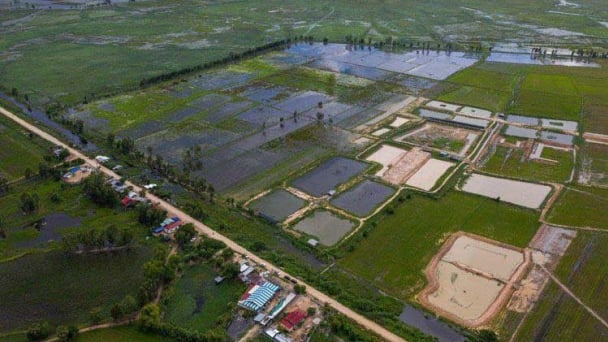
(VAN) Jiangsu province is gearing up to host training programs in Phnom Penh, the capital of Cambodia, this year to establish the Fish and Rice Corridor.
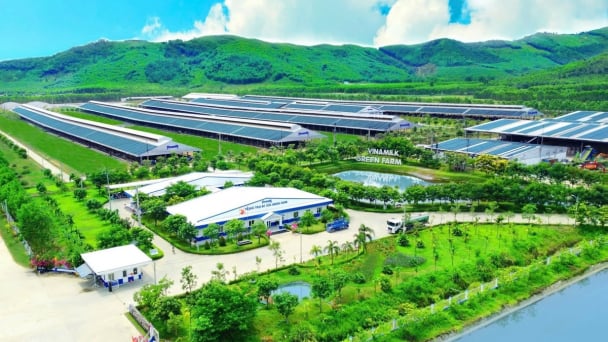
(VAN) Le Hoang Minh, representing Vinamilk, shared the company's experience in energy saving and green energy transition for production at a workshop held during the P4G Summit.
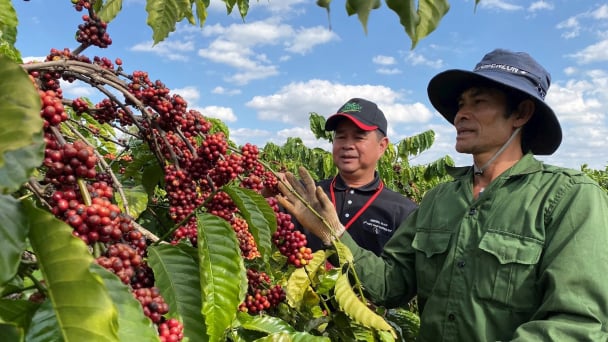
(VAN) Businesses emphasize fairness and equality when integrating social factors into their sustainable development strategies.